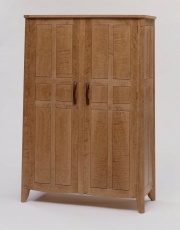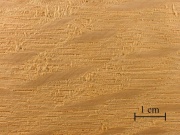Difference between revisions of "White oak"
(username removed) |
JMcGlinchey (talk | contribs) |
||
| Line 14: | Line 14: | ||
Medium tree growing to 30 m with spreading, oval crown Bark=light brown with blocky patches or scales Leaves=oblong (10-16 cm) with 7 to 10 rounded lobes. Fruit=long, oval acorn with warty cap, maturation takes one year | Medium tree growing to 30 m with spreading, oval crown Bark=light brown with blocky patches or scales Leaves=oblong (10-16 cm) with 7 to 10 rounded lobes. Fruit=long, oval acorn with warty cap, maturation takes one year | ||
| + | |||
| + | Paper fiber type: hardwood, ring porous. Using transmitted light microscopy, pulp is identified by two sizes of vessels with profuse pitting. The smaller late wood vessels of white oak will stain similarly to the early wood vessels, which can help distinguish from [[red oak]]. Vasocentric trachieds are worm-like and heavily pitted. Perforations are simple. Tyloses may be present. Appearance with [[Graff "C" stain]]: dark blue, but varies with bleaching. Average dimensions of fibers: length 1.47, 14-22μm wide. Common pulping method: [[kraft process|kraft]]. | ||
== Additional Images == | == Additional Images == | ||
Revision as of 08:48, 15 July 2015
Description
A large oak, Quercus alba, native to eastern North America. White oak has a light brown, coarse-grain wood that is strong. The high quality wood is used for lumber, millwork, and flooring.
Synonyms and Related Terms
Quercus alba; chêne blanc (Fr.); carvalho branco americano (Port.); stave oak; roble; roblecito; mamecillo; encino; cucharillo
Other Properties
Medium tree growing to 30 m with spreading, oval crown Bark=light brown with blocky patches or scales Leaves=oblong (10-16 cm) with 7 to 10 rounded lobes. Fruit=long, oval acorn with warty cap, maturation takes one year
Paper fiber type: hardwood, ring porous. Using transmitted light microscopy, pulp is identified by two sizes of vessels with profuse pitting. The smaller late wood vessels of white oak will stain similarly to the early wood vessels, which can help distinguish from Red oak. Vasocentric trachieds are worm-like and heavily pitted. Perforations are simple. Tyloses may be present. Appearance with Graff "C" stain: dark blue, but varies with bleaching. Average dimensions of fibers: length 1.47, 14-22μm wide. Common pulping method: kraft.
Additional Images
Authority
- G.S.Brady, Materials Handbook, McGraw-Hill Book Co., New York, 1971 Comment: p. 555
- Dictionary of Building Preservation, Ward Bucher, ed., John Wiley & Sons, Inc., New York City, 1996
- Website address 1 Comment: Virginia Tech Dendrology website at www.fw.vt.edu/dendro/dendrology/main.htm (accessed Oct. 8, 2005)
- Wikipedia, the free encyclopedia, at http://www.wikipedia.com Comment: http://en.wikipedia.org/wiki/White_oak (Accessed Oct. 8, 2005)





